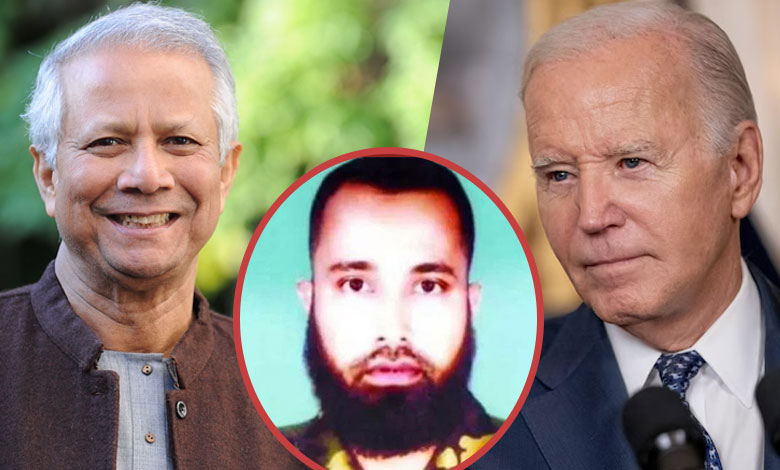US Demands Action: Will Bangladesh Release Al-Qaeda Operative Wanted by America?
The interim government of Muhammad Yunus in Bangladesh is facing severe backlash after reportedly initiating the process to acquit Syed Zia-ul Haque, a former Major of the Bangladesh Army and an alleged Al-Qaeda affiliate, who is wanted by the United States for his involvement in a 2015 terrorist attack in Dhaka.

Dhaka: The interim government of Muhammad Yunus in Bangladesh is facing severe backlash after reportedly initiating the process to acquit Syed Zia-ul Haque, a former Major of the Bangladesh Army and an alleged Al-Qaeda affiliate, who is wanted by the United States for his involvement in a 2015 terrorist attack in Dhaka.
The US Department of State’s Diplomatic Security Service offered a reward of up to $5 million for information leading to the capture of Zia, who is implicated in the murder of US citizen Avijit Roy and the severe injury of his wife, Rafida Bonya Ahmed. The couple was attacked by machete-wielding assailants while visiting a book fair in Dhaka, a crime claimed by the Al-Qaeda-inspired Ansarullah Bangla Team (ABT).
Zia-ul Haque’s Alleged Terrorist Ties and US Pursuit
Syed Zia-ul Haque, also known as Major Zia, has long been linked to radical Islamist activities in Bangladesh. He fled to Pakistan after the 2015 attack and has been on the US and Bangladesh’s most-wanted lists. In addition to his involvement in the Dhaka attack, Zia is suspected in several other criminal activities, including the murders of prominent Bangladeshis and his role in a failed 2011 coup attempt.
Zia was declared wanted by Bangladeshi authorities in 2016, who set a reward of Tk 2 million for information leading to his capture. His return to Bangladesh earlier this year, facilitated by a relaxation of visa restrictions for Pakistani citizens under the Yunus government, has raised significant concerns regarding the country’s counterterrorism stance.
Also Read: Saudi Arabia to Host First AFC Asian Cup in 2027 from January 7 to February 5
Acquittal Request and Growing Concerns
Following his return to Dhaka on a Pakistani passport, Zia applied for acquittal from all charges on December 29, 2024, requesting to be removed from the “most-wanted” list and have all convictions nullified. He also sought the withdrawal of the reward for his capture.
Reports indicate that Justice Mainul Islam Chowdhury, head of the International Crimes Tribunal’s disappearance committee, is Zia’s father-in-law, fueling accusations of a potential conflict of interest in the investigation.
Bangladesh’s Growing Allegiance to Radical Elements
This decision follows a pattern under Yunus’s interim government, which has previously freed Islamist figures such as Jashimuddin Rahmani, the leader of the Ansarullah Bangla Team. Rahmani’s release led him to call for jihad against India and promote radical Islamist ideologies, raising alarms about the government’s increasing leniency toward radical forces.
The Yunus administration’s acquittal of Zia could have devastating regional and global consequences. Analysts warn that Bangladesh may become a safe haven for terrorists and a hub for transnational criminal activities, including drug trafficking. This shift could destabilize the region and severely damage Bangladesh’s international standing.
US-Bangladesh Relations in Question
The Yunus government’s actions, including the facilitation of Zia’s return and the potential acquittal, are drawing international criticism. Some believe the US’s alleged support for Yunus is part of a broader strategy to counterbalance India’s influence in South Asia. Critics argue this strategy could inadvertently empower Pakistan and contribute to making Bangladesh a breeding ground for terrorism.
As Bangladesh moves further into instability under Yunus’s leadership, experts predict the country may face escalating sanctions from the international community, especially as a new US administration prepares to take office.
Implications for Bangladesh’s International Image and Security
The ongoing actions of the Yunus government are expected to severely damage Bangladesh’s reputation on the world stage, with far-reaching consequences for its security and foreign relations. With concerns over national and regional stability rising, the international community is closely monitoring Bangladesh’s next steps in handling radical Islamist elements within its borders.
Keywords: Bangladesh, Syed Zia-ul Haque, Yunus Government, Al-Qaeda, Ansarullah Bangla Team, US Reward, Terrorism, Radical Islam, Bangladesh Politics, International Relations, Security Concerns, Counterterrorism, Bangladesh News.
